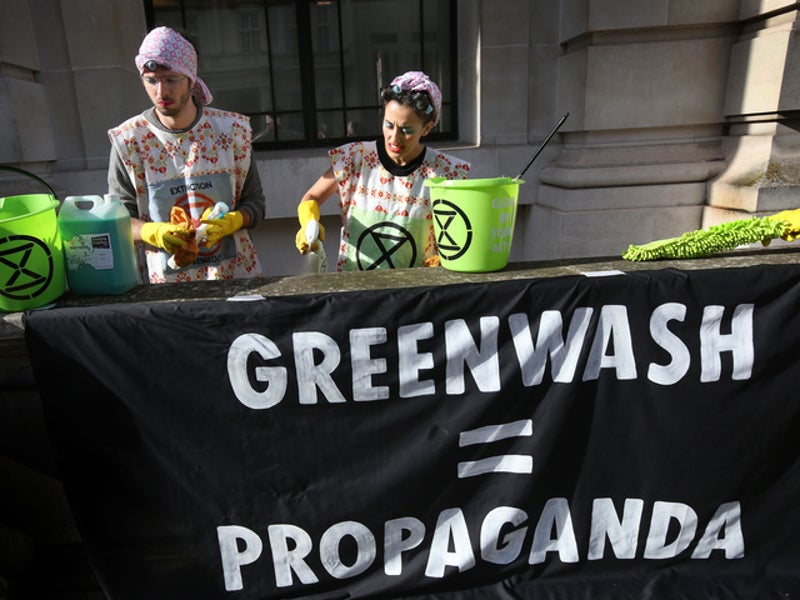
The energy sector is the primary contributor to the increase in CO2 emissions, and global energy demand is only expected to rise further in the coming decades as populations and economies grow, according to global energy consumption data. Since 1965, the data shows that 20 fossil fuel companies have been responsible for 35% of all energy-related CO2 and methane emissions worldwide.
This trend has continued in recent years. Since 2000, global CO2 emissions from fossil fuels and industry have increased significantly, reaching a record 36.7 billion metric tonnes in 2019.
Chevron is the leading oil and gas emitter, followed by Exxon, BP, and Shell. Since 1965, the products of these four companies have accounted for more than 10% of global carbon emissions.
Attempts to limit global warming to 1.5°C require a transition to net-zero emissions energy systems by 2050. However, evidence suggests some of the world’s biggest polluters are talking about net zero but not minimising their own carbon emissions.
Multiple studies document how oil majors have spread misinformation and obstructed progress on climate action. ExxonMobil denied climate change and propagated disinformation to mislead the public for over 20 years.
See Also:
Greenwashing social media ads
Now, a new investigation by Thomas Lewton, an independent science journalist, for The Guardian and Eco.bot , a network based performance services, in August 2022 has revealed that this year, BP has spent more than $944,956 (£800,000) on social media ads in the UK to promote the company's green energy investments.
How well do you really know your competitors?
Access the most comprehensive Company Profiles on the market, powered by GlobalData. Save hours of research. Gain competitive edge.

Thank you!
Your download email will arrive shortly
Not ready to buy yet? Download a free sample
We are confident about the unique quality of our Company Profiles. However, we want you to make the most beneficial decision for your business, so we offer a free sample that you can download by submitting the below form
By GlobalDataJust before the company announced its $8.28bn (£7bn) 14-year high profit for the second quarter of 2022, it paid around $673,281 (£570,000) to Facebook and Instagram for ads that reached tens of millions of people in the UK.
The ads began two days after the opposition Labour Party proposed a windfall tax on North Sea oil and gas in January 2022, emphasising BP's contributions to UK energy security.
The Eco.Bot investigation uncovered that BP's spending on these ads increased in the weeks leading up to the then Chancellor of the Exchequer and would-be British prime minister Rishi Sunak's announcement of an "energy profits levy" on 26 May 2022.
“If BP’s renewable energy investments [are considered], they make up one share of a portfolio that is still dominated by fossil fuels,” Gregory Trencher, an energy policy and sustainability transitions researcher at Kyoto University told Offshore Technology. “Furthermore, though pledging to reduce its fossil fuel production by 40% leading to 2030, BP plans to increase its sales of fossil fuels produced by third parties.”
Shifting responsibility from company to consumer
Several corporations have attempted to shift responsibility for climate change from themselves to consumers. One example is BP's promotion of lowering individual carbon footprints, some research suggest.
In the 1980s, BP first promoted and helped popularise the term "carbon footprint." In 2004, the company unveiled its “carbon footprint calculator”, which allowed users to assess how everyday activities, like going to work, buying food and travelling, contributed significantly to climate change. A decade and a half later, the term "carbon footprint" was widespread.
Major American and European corporations have spent millions of dollars lobbying to delay or weaken climate policy. A recent investigation found oil companies use social media advertising to influence public opinion.
Fossil fuel companies are among the top spenders on Google ads that look like search engine results, which campaign groups label “endemic greenwashing”. In a 2020 survey, more than half of customers said they couldn't identify the difference between a paid-for listing and a regular Google result.
In 2021, BP hired a public relations firm to promote the narrative that climate change is the fault of people, not an oil giant.
"This industry has a proven track record of communicating strategically to confuse the public and undermine action,” Geoffrey Supran, a science historian at Harvard University, told Mashable in 2021.
“We need to pay attention”
“Society, investors, and politicians expect this [green investments], and the young generation that principally uses social media are becoming [increasingly] sensitive to the carbon intensity of many industries, not just oil,” says Gregory.
“We need to pay attention,” Nikita Shiel-Rolle, a climate justice activist in The Bahamas, told Offshore Technology.
Many ads now use a variety of clever tactics to draw in the user. As well as miicking search engine results, they might fill your screen with green or use vague terms like "all-natural," to persuade you the products they are advertising are good for the environment.
“Furthermore, there have been increasing claims from Europe and the US that oil majors are greenwashing, and they are increasingly villainised as major contributors to climate change,” says Gregory. “In such a context, it is more important than ever that the oil majors convey an image of transitioning to clean energy.”
According to a 2009 survey, 80% of marketers planned to increase spending on green marketing to target more environmentally responsible consumers.
The European oil majors have repeatedly recognised climate science, taken part in industry climate action initiatives, implemented internal carbon pricing, spent and pledged more on clean energy, and set net-zero transition and energy product decarbonisation goals.
However, an analysis by NGO Oil Change International found that BP’s plans are far from sufficient [9] to limit global warming to 1.5°C above pre-industrial levels, as outlined in the Paris Agreement.
Improving corporate image
“Corporate interests have used advertising for many years to improve their reputation,” Laura Edelson, a researcher in online political communication at New York University, told The Guardian. “When it comes to corporate taxes, reputation matters to politicians.”
BP’s ads promote its plan to "transition to net-zero" by gradually reducing oil and gas production and investing more in "low carbon" and renewable energy sources.
“Targeting the younger generation, who are more sensitive to climate change, is the objective of the social media marketing strategy,” Gregory says.
“As consumers, we must be clear about what we're consuming and develop that critical eye [to understand what’s wrong],” says Nikita. [That] requires exposure and [more] money into that type of educational development.”
Meta’s ad library, which was the basis for the Guardian/Eco.bot investigation, disclosed data about ad spending and reach for social issues, and political advertising, and only for those ads that remained visible in its archives.
Meta had removed Shell ads for violating its transparency policy, for example, the investigation found that dozens of other, similar ads running without any kind of disclaimer about who paid for the ads, for over a month seemed completely unnoticed by Meta's moderation process.
It is unrealistic to expect corporations to eliminate their environmental footprint overnight. To get to a more sustainable economy, it can be beneficial to celebrate even minor achievements. However, those achievements must be truthfully communicated.






